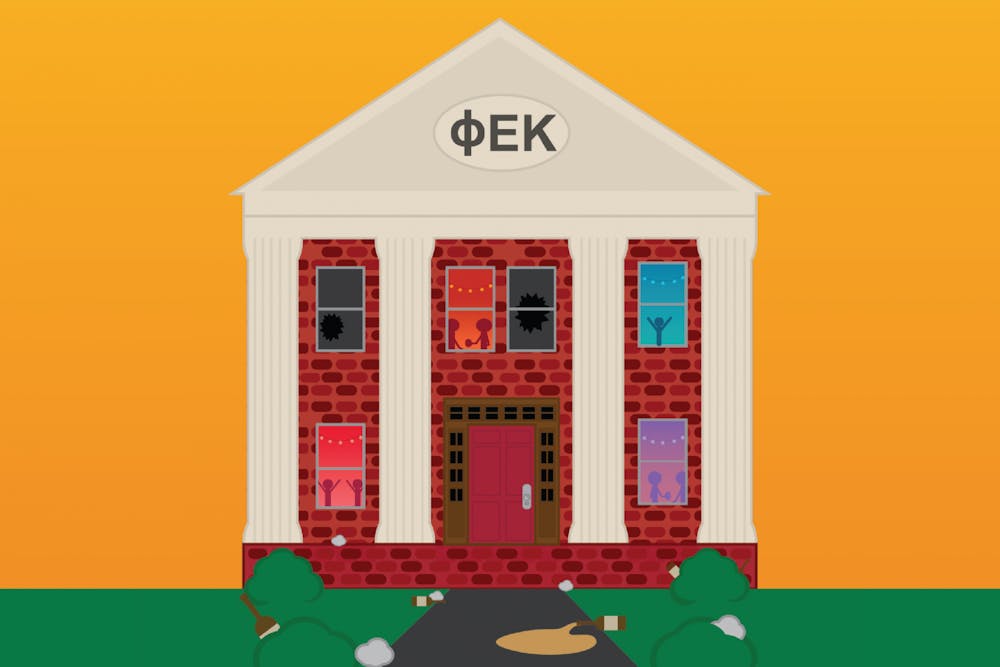One thing has remained constant within the past few years at the University of South Carolina: Fraternities receiving violations. While the university has made several strides to punish these fraternities, more must be done to prevent harm.
Many chapters at USC have gotten in trouble for hosting events, such as parties and tailgates, that included the serving of alcohol; there have been too many to count.
Fraternities can often have positive attributes in promoting strong academics, community service and friendship. However, some more serious allegations have been brought to light that have garnered a lot of negative attention.
According to HazingPrevention.Org, hazing is any action taken or situation created that spurs “embarrassment, harassment, or ridicule” and risks emotional or physical harm to the individuals involved, regardless of their “willingness to participate.”
In the past four years, at least five chapters have been found responsible for hazing and other violations, many of which have repeated-offenses.
In 2017, Tau Kappa Epsilon, Kappa Alpha Order, Phi Sigma Kappa and Beta Theta Pi were all found to be responsible for incidents of hazing or similar offenses.
Of these, the most extreme case had an incident report consisting of “personal servitude, calisthenics and inappropriate activities in the new member education experience.”
In 2018, extreme events took place within several chapters, such as physical altercations, theft, damage to property and even starting a fire. Kappa Alpha Order, Sigma Alpha Epsilon, Alpha Epsilon Pi and Chi Psi were among the many involved in such activities.
In 2019, the most common violations were found to be in the distribution of alcohol, forced physical activities and failure to comply in initiation deadlines. Kappa Alpha Order, Alpha Epsilon Pi, Phi Sigma Kappa and Sigma Nu were among the common violators of the university's rules.
Lambda Chi Alpha was suspended until August of 2023 for violations for alcohol violations, physical altercations, hazing and allegedly harassing a reporter that was covering the story.
Among Lambda Chi Alpha’s suspension, one of the most extreme incidents that have taken place beyond these past four years was the Sigma Chi chapter being kicked off campus.
According to the police report filed in the spring of 2016, there were “drops of blood on the floor, some broken glass in the hallway as well as a bloody paper towel.” Other findings included a pledge found to have been bruised and bleeding from a supposed “basketball game.”
The most devastating effect of a fraternity’s actions here resulted in the death of an 18-year old pledge of Pi Kappa Alpha, Charlie Terreni Jr., who was found following the night of a party held in 2015.
Come this past fall, most of the violations chapters received were due to failure in complying with the university’s public health directive regarding COVID-19. With this in mind, the violations increased considerably compared to the previous year.
When situations such as these occur with fraternities, the university will typically impose fines and conduct-probation, suspend any social activities, impose educational sanctions or suspend that chapter off of campus in the most extreme cases.
While these consequences seem simple enough, university officials must do more. Any member of the Carolina community should feel concerned in the fact that many of the violations listed above are similar throughout each year and often repeated by the same fraternities. For example, Phi Sigma Kappa had both drug and alcohol-related incidents on different dates within the same semester, let alone between years such as with other fraternities.
While an anti-hazing pledge exists, more can be done. Inside Higher ED writer Nick Altwies suggested each chapter should require a trained alumni adviser to promote safety and well-being and should have to publish all data and incidents for parents and potential pledges to view, such as average GPA and campus or national fraternity rules violations.
Publishing all data and incidents would add accountability and incentivize fraternities to want to have as few statistics as possible in order to appeal to potential pledges and their families.
The university must strive to implement consequences that last to prevent tragedy from occurring in the future.

